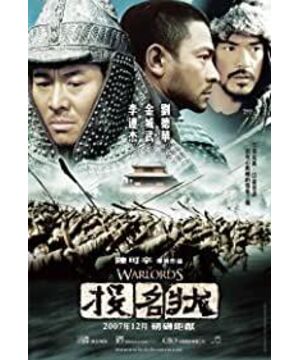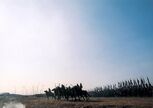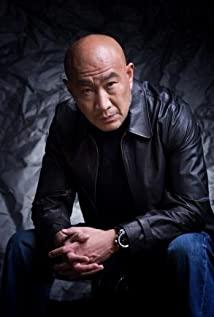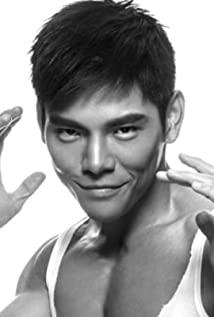This question has been lingering in my mind for a long time as early as Zhang Yimou's "Hero" stage, and after watching Chen Kexin's well-made "Certificate of Fame", it has to come out of my chest, and it's out of control.
Pang Qingyun, Zhao Erhu and Jiang Wuyang forged a vote, and they will live and die together from now on. At the beginning of the movie, it didn't say what great career this Pang Qingyun, who came back from the dead, had in mind, but he was much more shrewd and more shrewd than Zhao Erhu, who was a bandit who didn't know any words. Jiang Wuyang seemed to understand, but he felt that what Pang Qingyun said and did was very reasonable, and cruelty was a bit cruel, but people like them were originally from bandits who killed people without blinking an eye, and it was meaningless to talk about benevolence, righteousness and morality.
As the plot unfolds, this Pang Qingyun, who has been killed all the way down, can really be said to be a success. He can abandon everything, and his dignity, faith, and friendship are all under his feet. He can feel sorry for his brother's life, but he will never He won't be soft-hearted when he says "kill" without hesitation, and those who have achieved great things are indeed fearless and graceful!
From the point of view of Zhao Erhu's principle, Pang is a perfidious villain, a hypocrite with inconsistent words and deeds. Although he himself is not afraid of death, the comparison of various changes before and after and his servile appearance in the court, Zhao If Pang is a hypocrite, probably no one will disagree; Jiang's principles are looser than Zhao's, and he is confused and confused in the so-called "big things", "people", "world safety" and other big meanings, he can understand And the only thing that can be grasped is that one of the names: whoever disturbs my brother will be killed; whoever kills my brother will be killed. As long as the brothers are safe and sound and move towards the common goal, everything will be fine, so he doesn't care much about whether Pang is a hypocrite or a real villain, whether he has a deep sense of righteousness or is ignorant. I think in the process of Jiang and Zhao following Pang together, Jiang Wuyang had a clearer life, and there was not much inner struggle.
The Pang Qingyun played by Jet Li is the really interesting protagonist. Call him hypocrisy. Indeed, while exhorting his bandit-born brothers not to kill the people arbitrarily, he turns his head around as long as he hinders his great cause, no matter who he kills without blinking his eyelids; but when he earns his life on the battlefield, he Brave than anyone else, he is not greedy for life and fear of death, and he can even be said to be sincere to his brother! We can also evaluate Pang Xin as tyrannical, ruthless, and disregarding brotherhood for his own selfish interests. He is a complete villain and villain. But after Pang Rong served as governor of Jiangnan, it is also a fact that he petitioned the Queen Mother for the people of Jiangnan in the Golden Palace. When the attack on Suzhou could not be beaten, he went hungry with everyone, and worked hard for the soldiers to keep them warm. This Pang Qingyun is a character full of contradictions, and his great cause is definitely not just as simple as skyrocketing. He was born and died on the battlefield, and ordinary glory and wealth must not be what he sees. He is cold-blooded and even cruel, but this is not by nature. His cruelty is calculated and always the best way to deal with a certain situation. Even Jiang Wuyang always says, "I know that eldest brother is right." If such a hero among the people finally gains power, the comment behind him should be "deeply cherish our memory of our great military strategist and statesman".
The most fundamental reason for this contradiction, I think, is Pang Qingyun's "great cause". True, he is an ambitious figure, but his ambitions are not selfish. This fighter who climbed out of the dead pile has experienced the blood and fire baptism of war. Although the film does not clearly point it out, I think his great cause should be the world, and it is really to keep one side safe and the people live in peace; even if he takes 10,000 steps back , but also to the brothers who lived and died together with him to have enough food and clothing, and no longer be oppressed. It's not fair to use "ambition" to evaluate such a goal in life. At least he should be a junior revolutionary who cares about the common people and loves all directions. It is no exaggeration to say that he is noble.
What Pang Qingyun is not noble enough is his means and process to achieve his noble life goals.
In order to win Shucheng, he let the soldiers fight at sea, knowing that he was sending people to the gate of hell, but he also gritted his teeth and encouraged the soldiers to work hard; in order to conquer Suzhou, he could borrow food from the former mortal enemy, in exchange for the safety of the people after the city was broken. In order to save food and prepare for war, he can shoot unarmed prisoners with random arrows; for smooth career, he can sacrifice his brother's life with both hands. Yes, we can blame him for being ruthless and unprincipled, but if you are in Pang Qingyun's position, "what the eldest brother did is right", will your choice be different?
In the movie "Operation Swordfish", if you can save 10,000 people by sacrificing the lives of a few people, you have the final decision. Do you do it? Let me take this issue a bit more extreme, sacrifice hundreds of innocent children and save a million people, will you do it?
This is the dilemma between Tony Leung Chiu-wai's killer sword in "Heroes". If you kill the King of Qin, the world will continue to be in chaos, and the people will be trapped in water and fire from time to time; if you don't kill the King of Qin, life will be ruined in a short time, but you can hope for a peaceful reconstruction after the war. If you assassinate Qin, how do you choose?
The sanctity of the purpose and the cruelty of the process, which is the final element that characterizes the whole event?
Going back to the "Death Letter", of course, we can analyze in detail whether Pang Qingyun's so-called "great cause" is a long way to go to protect the people, but this is actually evading the problem. When a truly divine purpose requires man to use extremely despicable means to achieve, the tragedy is irreversible, because this is the eternal Dilemma that man cannot reasonably answer.
In the final analysis, man is not God after all, and we cannot see that far in life. The so-called purpose is nothing but the midpoint where one can rest on the endless journey, and it becomes the end point because it cannot be crossed. The cruelty of the process is visible and inevitable; the sanctity of the purpose is just a kind of good expectation to some extent, and its achievement is affected by many other factors, such as luck, in addition to human efforts. These uncertain factors other than manpower sometimes dominate the process of the whole situation, causing many regrets that backfired, making the previous sacrifice, cruelty, and forbearance meaningless. In this case, it is extremely unreliable to analyze whether the starting point of the original behavior is sacred, because the sacredness of the purpose can only be measured by the result, and without the result, only the cruelty of the process remains.
At the end of Operation Swordfish, there is a scene where the luxury cruise ship of Middle East terrorists explodes inexplicably on the high seas. This is to use the visible positive results to prove the sanctity of the purpose, to prove that the cruelty of the process is tolerable and worth sacrifice. The reason why "Heroes" dares to use a rough or even pieced together story to present such a difficult issue is because we all know the process of history, and the fate of the seven kingdoms cannot be changed; "Famous Name" highlights the cold-blooded cruelty of Pang Qingyun's actions , which corresponds to the ending of his inexperience and failure. The film only gives this villain a limited positive image, and still avoids the source of the contradiction in the end: If Pang's great cause in the world is successful, how should he judge his merits and demerits?
When you can't see the results, which is more important, the purpose or the process?
To answer this question, one need only look at extreme examples in the real world. The suicidal terrorist activities of Muslim extremists all use the guise of a sacred purpose to justify cruel and dirty means; the US invaded Iraq also to justify its aggressive behavior for the invisible "weapons of mass destruction". In essence, the sanctity and rationality of the purpose cannot be proved at all, at least there is no reasonable mechanism to systematically prove it effectively. Proving the so-called sacred purpose can hardly escape the suspicion of rogue. From this point of view, the means, or the process, is the final criterion that can characterize the entire event. No matter how noble the so-called purpose is, it cannot withstand the bloody brutality of the process. Apart from the gods, who in the world is qualified to use the lives of others as bargaining chips for their own great cause? !
As for a politician, the nature of his profession determines that he inevitably has to make a dilemma between the purpose and the process, because no matter how noble the political purpose is, the means to achieve it are never clear. The political arena is a moderated battlefield, the smoke of gunpowder is filled with laughter and noise, and behind the staggering of gongs and chips is the colorless and silent wind of blood and rain. Politicians who really petition for the people, although they have noble principles in their hearts, have to use despicable political methods in their implementation, sometimes they have to be friends with the enemy, and sometimes they have to sacrifice their colleagues. Such feelings must be painful and oppressive. This kind of forbearance waiting to bite the teeth into the stomach must be very strong and strong. Therefore, a politician with noble purposes cannot be happy; nor can a happy politician be noble.
Politics, then, is at its best to use dastardly means to achieve a so-called noble end, if the end is immediately visible and confirmed by the results. Other than that, politics is nothing but dirty.
View more about The Warlords reviews











